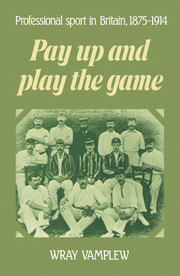Book contents
- Frontmatter
- Contents
- List of tables
- Preface
- Acknowledgements
- A guide to prices, 1870–1914
- Part I An overview
- Part II The development of professional gate-money sport
- Part III Sport in the market place: the economics of professional sport
- Part IV Playing for pay: professional sport as an occupation
- Part V Unsporting behaviour
- Part VI A second overview
- 19 An industrial revolution in sport
- Appendices
- Notes
- Bibliography
- Index
19 - An industrial revolution in sport
Published online by Cambridge University Press: 16 February 2010
- Frontmatter
- Contents
- List of tables
- Preface
- Acknowledgements
- A guide to prices, 1870–1914
- Part I An overview
- Part II The development of professional gate-money sport
- Part III Sport in the market place: the economics of professional sport
- Part IV Playing for pay: professional sport as an occupation
- Part V Unsporting behaviour
- Part VI A second overview
- 19 An industrial revolution in sport
- Appendices
- Notes
- Bibliography
- Index
Summary
During the eighteenth and nineteenth centuries popular sport in Britain was influenced significantly by economic development, particularly industrialisation. The demands of the Industrial Revolution changed workingclass leisure by reducing the amount of free time available and by contributing to the pressure which altered the character of many traditional sporting pastimes. Later, however, the productivity-raising innovations associated with industrialisation enabled both incomes to be increased and leisure time to be extended. These parallel developments stimulated a demand for commercialised spectator sport, a demand enhanced by growing urbanisation, which offered entrepreneurs concentrated markets.
What should be stressed is that it was not until the economic benefits of industrialisation filtered down to the mass of the population that a large and regular paying clientele could be relied upon for sports events. Thus the rate of economic development in Britain inevitably restricted the scale of commercialised sport till the late nineteenth century. Income levels in the eighteenth century were such that popular sport, at least at the spectator level, was generally dependent upon patronage; most onlookers could only afford to view what was offered free of charge. Where payment was required events were infrequent and attempts to hold them more regularly failed because of a lack of consumer spending power. Industrialisation eventually brought rises in real income, but the Industrial Revolution was a much more drawn-out process than its nomenclature implies and, although industrial workers made real-income gains from the 1820s on, they remained a distinct minority of the occupied population well beyond that date.
- Type
- Chapter
- Information
- Pay Up and Play the GameProfessional Sport in Britain, 1875–1914, pp. 281 - 284Publisher: Cambridge University PressPrint publication year: 1988



